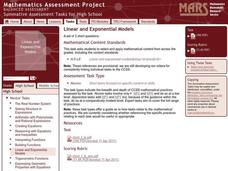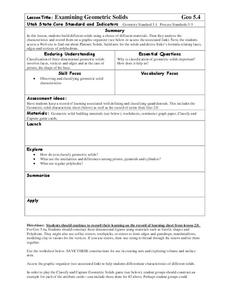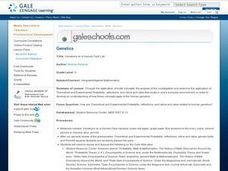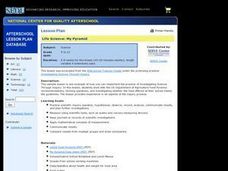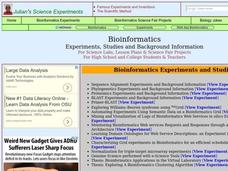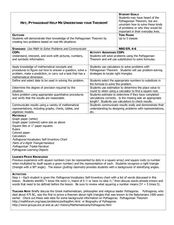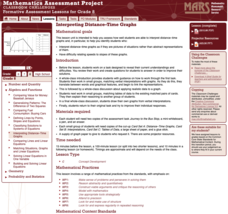Curated OER
Class of Gold
How can you see a number in nature? Here, learners discover both Fibonacci numbers and the golden ratio by exploring a number of different resources. Note: Some of the resources are older and may be missing some of the links, but the...
Curated OER
Linear and Exponential Models
Linear or exponential, see if your class can tell the difference. This very basic worksheet looks at different representations including tables of values, graphing, and an equation to assess understanding. This would make a good warm-up...
Curated OER
Trigonometric Functions
Here is a worksheet that includes three short trigonometry problems. Learners must use trigonometric definitions and identities to solve. Use this resource to review trigonometry, or as an assessment.
Curated OER
Power Crisis in California
Students read an online CNNfyi.com article related to the energy crisis in California. They calculate the monthly cost of running household appliances. They develop a list of alternative methods of energy sources.
Curated OER
Speed Trap
Young scholars explore the usefulness of algebraic skill development as they make decisions based on their ability to accurately estimate the speed of moving vehicles. The life and death possibilities place an interesting"spin" on this...
Curated OER
Examining Geometric Solids
Students explore geometry by completing a math worksheet in class. In this shape identification lesson, students identify the characteristics associated with 15 solid geometric shapes. Students identify patterns between vertices, edges...
Curated OER
Picture Frames and Algebra
Students evaluate the area of a picture frame and write algebraic representations. In this algebra lesson, students work in groups to find the area of different picture frames. Students then write algebraic expressions and present then...
Curated OER
How to Weigh a Car with a Tire Gauge
Students calculate the weight of a motor vehicle using only a sheet of graph paper and a tire gauge. Extensions provided offer additional challenges.
Curated OER
Variations on a Human Face Lab
Ninth graders gain an application level understanding of probability, symmetry, and ratios and rates that exists in one's everyday environment relative to human genetics.
Curated OER
To Float or Not to Float, That is the Question?
Ninth graders develop operational definition of density, do computations using density equation, categorize pieces of matter as being able to float on
water or not, based on density, explain why some objects sink or float based on...
Curated OER
Life Science: Heavy Weight
Students investigate adolescent obesity and its health impact. In this health and obesity lesson, students research the problem, develop a survey regarding eating habits, then analyze the nutritional information on commonly eaten foods...
Curated OER
Life Science: My Pyramid
Students examine how the school food program compares to the food pyramid recommendations. In this food pyramid lesson plan, students compile data regarding the food choices available in the school through the lunch program and vending...
Curated OER
Bioinformatics
Learners conduct a series of scientific investigation using bioinformatics. In this molecular biology lesson plan, students collect experimental data using different educational softwares. They calculate and analyze relationships using...
Curated OER
Miras, Mirrors, and Kaleidoscopes!
Learners use hands-on activities to explore transformations. They view a video segment that demonstrate how M. C. Escher employed geometry and transformations to create so many of his famous drawings.
Curated OER
Access Ramp
Just about every public building that your students are familiar with has an access ramp which complies with ADA requirements. As it turns out, designing such a ramp is an excellent activity to incorporate slope, the Pythagorean Theorem,...
Curated OER
The Importance of Making Labs a Priority
The benefits of inquiry-based exploration can be attained in any classroom.
Cornell University
Fibers, Dyes, and the Environment
Nanofibers can be made through electrospinning or force spinning in order to reduce the negative impact on the environment. Pupils study the role of fibers and dye on the environment through a series of five hands-on activities. Then,...
Curated OER
Task: Range of Motion
If you have ever injured your shoulder, you know it takes a while to improve your arm's range of motion. In this real-world example, young mathematicians gain insight into the world of physical therapy while they analyze a case study...
Curated OER
Discovering Pi/Welcome to Pi Day
Students explore pi. In this circle measurement lesson, students define and identify radius, diameter, circumference, and perimeter. Students work in groups to measure several plastic lids and record their findings. Students compare the...
Curated OER
Hey, Pythagoras! Help Me Understand Your Theorem!
Learners explore the Pythagorean Theorem. In this math lesson, pupils solve problems using the Pythagorean Theorem. They select the appropriate numbers to substitute in the formula to solve problems.
Mathematics Assessment Project
Identifying Similar Triangles
Math whizzes work with angle sums and exterior angles to figure out the measure of other angles. This particular publication provides comprehensive support in the form of an anticipatory activity, questions designed to prompt discussion,...
Discovery Education
The Everyday Science of Sports
Physical science juniors will enjoy this sensational enrichment on aerodynamics, especially if they are also sports fans! With a focus on physical features and behaviors, collaborative groups make observations on five different golf...
Alabama Learning Exchange
How Big Can a Bee Be?
Mathematicians analyze the relationships between surface area and volume. They conduct Internet research, conduct various experiments, record the data in a spreadsheet, and graph the results and compare the rate of increase of surface...
Mathematics Assessment Project
Interpreting Distance–Time Graphs
Pre-algebra protégés critique a graph depicting Tom's trip to the bus stop. They work together to match descriptive cards to distance-time graph cards and data table cards, all of which are provided for you so you can make copies for...



